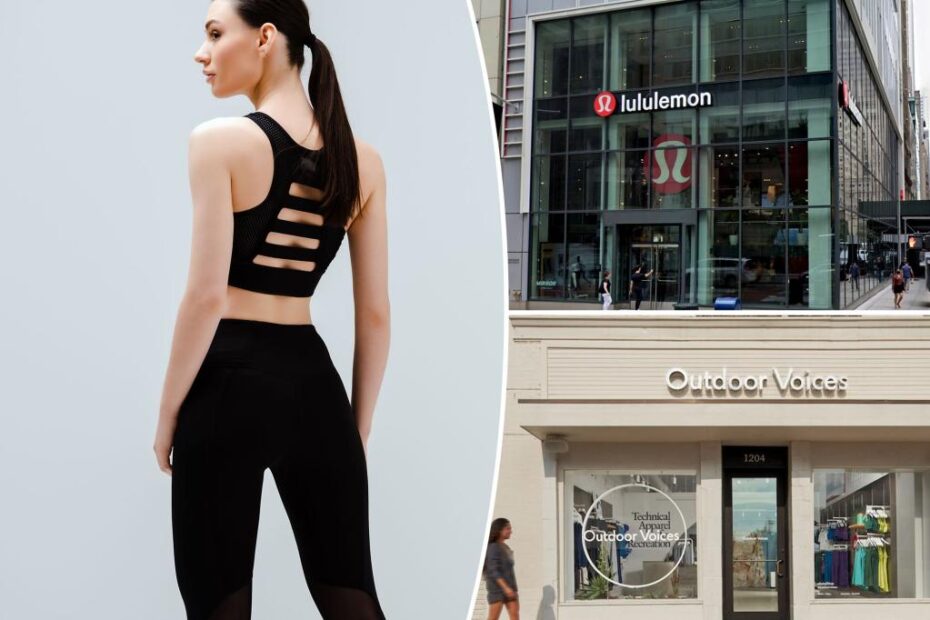[ad_1]
Is premium athletic apparel entering its flop era?
Despite the booming success of industry darlings like HOKA and On Cloud — two sneaker brands with a cult-like consumer following — top contenders in the activewear market are faltering in sales.
Some are even shuttering.
Lululemon’s Q4 report revealed stalling sales in the Americas, only growing 9% — significantly less than the year prior despite its steady success throughout the COVID-19 pandemic and related supply-chain hiccups. Shares in the apparel giant, which once gave competitors a run for their money, plummeted 16% as a result.
In a call with earning analysts, per CNBC, company CEO Calvin McDonald admitted that they were “navigating what has been a slower start to the year in this market,” attributing it to a “shift in the US consumer behavior.”
Meanwhile, Nike warned of a potential revenue dip and slashed inventory of some legacy styles last month, with the company seeing its own dip in shares.
“One of the things that both Lululemon and Nike have enjoyed over the last few years is premium prices on their premium products and that seems to be in doubt at this point in time,” client portfolio manager Brian Mulberry of Zacks Investment Management, which has a stake in Nike, told Reuters.
But the sales slump is hardly isolated to a small cohort of companies.
Premiere sports brands are experiencing hardship across the board: Puma projected a weak start to the year amid a “challenging market,” Under Armour saw a revenue decrease and Adidas reported its first annual loss in three decades.
Even Allbirds — the once beloved sensible shoe manufacturer with an emphasis on comfort worn by the likes of presidents — has been hit with performance pitfalls, with the company’s founder Joey Zwillinger announcing last month that he would be replaced as CEO by its former COO, Joe Vernachio.
In March, athleisure retailer Outdoor Voices shuttered 16 of its storefronts as it transitioned to a strictly online presence, the New York Times reported. The valuation of the decade-old brand dropped $60 million from 2018 to 2020, and senior-level executives exited the company.
At the time, founder Ty Haney stepped down as CEO yet remained on the board, telling The Cut last year that she felt “sad” for the brand, which, she publicly lamented on Instagram, had lost its way.
Now, longtime frontrunners in the industry are battling for market share with exciting new companies like Vuori, a young, buzzy brand valued at $4 billion as of 2021. Then there’s the Kardashian-Jenner-backed label, Alo Yoga, which has built an empire catered to Erewhon-loving, aesthetics-centered Gen Z consumers.
The company, which took a spin in the futuristic Metaverse, envisions itself with more of a digital presence rather than a traditional brick-and-mortar, the company’s co-founder and CEO Danny Harris told the Wall Street Journal.
“I really see Alo being more like Tesla, and the other guys being Ford and Chrysler and General Motors,” he said.
Billing physical storefronts as “sanctuaries,” complete with matcha on tap and fitness classes per the Journal, Alo is building more than a brand. It’s selling a complete lifestyle — and people are buying. In 2022, the company reportedly earned $1 billion in sales.
“It definitely does seem cooler and more relevant than Lululemon,” author Ana Andjelic told The Journal. “Why do I think that? I have no idea. Which is exactly what you want when branding works — when people can’t explain why something seems cooler than something else.”
To rival sexier, up-and-coming brands, innovation has become a priority for the legacy labels that could fall behind.
Lululemon, according to Business of Fashion, seemed to grow too fast — facing the challenge “to dream up new ways to grow,” they write — and ran out of steam after years of impressive performance as athleisure became a streetstyle norm post-pandemic. The retailer, however, is toying with sustainable garments made from recycled materials to offset what the outlet has called an “innovation problem.”
Meanwhile, Nike announced it would be cutting back on signature styles to focus on novel, next-level performance products. According to Business of Fashion, CEO John Donahoe used the hot-button word — “innovation,” that is — 20 times on the earnings call.
“It’s not just about a product or an item here and there — it’s about building a robust pipeline of innovation,” Donahoe said.
